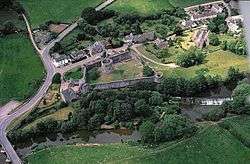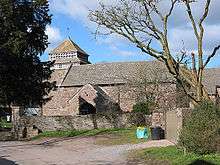Skenfrith
| Skenfrith | |
| Welsh: Ynysgynwraidd | |
 Skenfrith from the air, showing the castle and River Monnow |
|
 Skenfrith |
|
| OS grid reference | SO457201 |
|---|---|
| Principal area | Monmouthshire |
| Ceremonial county | Gwent |
| Country | Wales |
| Sovereign state | United Kingdom |
| Post town | MONMOUTH |
| Postcode district | NP7 |
| Dialling code | 01600 |
| Police | Gwent |
| Fire | South Wales |
| Ambulance | Welsh |
| EU Parliament | Wales |
| UK Parliament | Monmouth |
|
|
Coordinates: 51°52′37″N 2°47′17″W / 51.877°N 2.788°W
Skenfrith (Welsh: Ynysgynwraidd) is a small village in Monmouthshire, south-east Wales. It is located on the River Monnow, close to the border between Wales and England, about 6 miles (9.7 km) north-west of Monmouth. The road through the village (B4521) was once the A40, linking Ross-on-Wye and Abergavenny.
History and amenities
The Welsh placename Ynysgynwraidd, from which the English name derives, means "island of Cynfraeth", possibly a local 6th century leader.
Skenfrith is most famous for its castle, one of the Three (or 'trilateral') Castles – with Grosmont Castle and White Castle – built in the area after the Norman conquest by Marcher Lords to subjugate and dominate this part of the turbulent Welsh Marches into the medieval period. The castle was substantially rebuilt by Hubert de Burgh between 1219 and 1223, but by 1538 it was abandoned and in ruins.

St. Bridget's Church, Skenfrith was first mentioned in 1207, and was reconstructed and enlarged in the 14th century. The church has a squat tower and large buttress. The whole is listed Grade1. The interior has a Jacobean pew and the tomb of the last governor of the Three Castles.[1] It also holds the Skenfrith Cope, an embroidered vestment of red velvet and linen which has been dated to the late 15th century. Its design shows the Assumption of the Virgin, surrounded by angels and saints.[2]
The village gave its name to one of the historic hundreds of Monmouthshire.
The Bell at Skenfrith, originally a 17th-century coaching inn, was voted Michelin 2007 Pub of the Year, for the whole of Great Britain.[3]
Skenfrith was used as the location for the fictional village of "Upper Leadworth" in the Doctor Who episodes "Amy's Choice", broadcast on 22 May 2010 and the related Doctor Who Confidential episode "Arthurian Legend". In the episode quoted Skenfrith was labelled as the village which time forgot.
In June 2010 a regular produce market opened in the village hall on the second Saturday of each month. This was set up to promote local producers of meat, poultry, fruit and vegetables, honey, eggs, bread, jams and preserves, cakes, cider, beer and cheese.[4] The market is now well established and is regarded as one of the best local produce or farmers' markets in the Monmouthshire-Herefordshire border country.
Friends of St. Bridget's
There is an active secular charity, The Friends of St. Bridget's, Skenfrith, which supports the repair and maintenance of the church and has raised funds, in particular for the recent conservation project and new display and conservation of the pre-reformation cope. Patrons include the Lord Lieutenant of Gwent Simon Boyle, Sara Fulgoni and Sir Roy Strong. The Friends run a monthly sweepstake.[5]
See also
References
- ↑ Skenfrith at Britainexpress.com
- ↑ Leaflet, The Skenfrith Cope, Church of St. Bridget, Skenfrith
- ↑ The Bell at Skenfrith
- ↑ The Skenfrith Produce Market website
- ↑ "Friends of St. Bridget's, Skenfrith". friendsofstbridgetsskenfrith.co.uk/. Retrieved 13 June 2013.
External links
- The Skenfrith church and village website
- Castle Wales website on Skenfrith Castle
- Skenfrith Produce Market website
- Skenfrith Festival
- Friends of St. Bridget`s. Skenfrith
- Map sources for Skenfrith